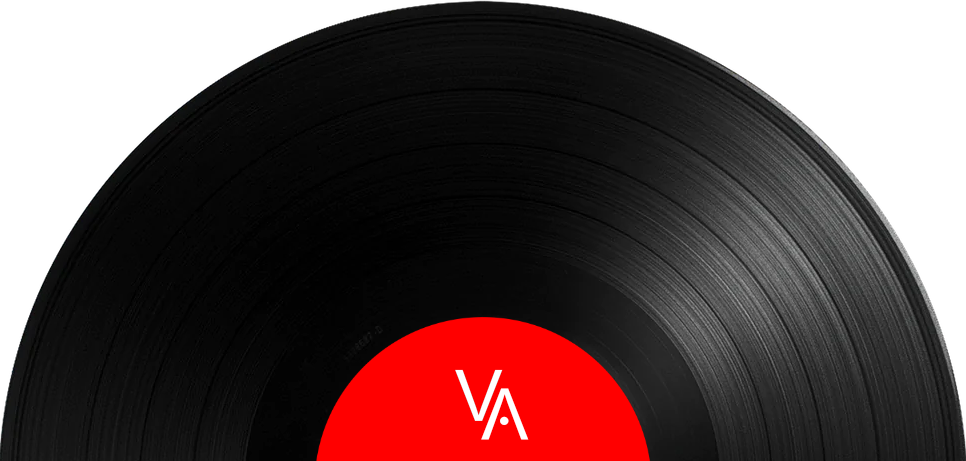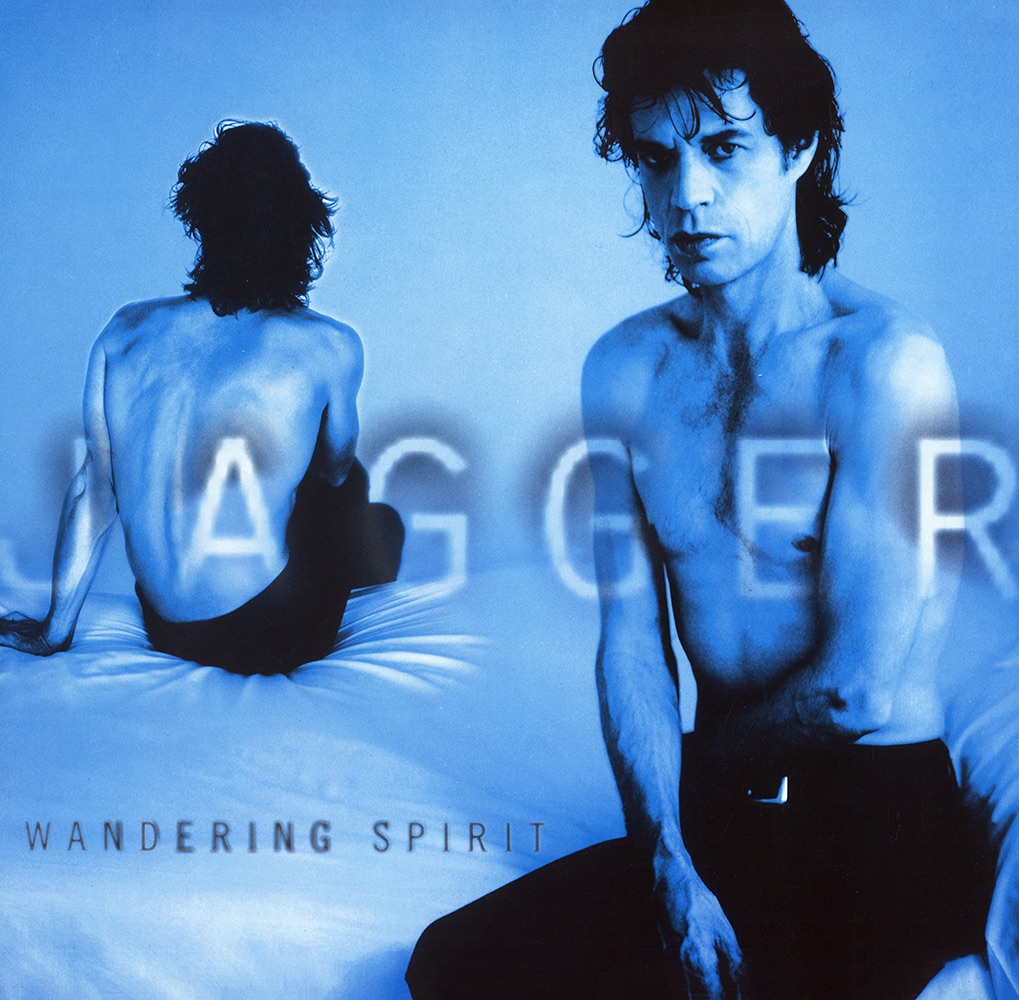
Wandering Spirit is the third solo album by Mick Jagger, Rolling Stones mouthpiece extraordinaire. It was released in 1993, with Rick Rubin co-producing alongside Jagger. While Mick was busy not being a Rolling Stone, Keith Richards was at the same time busy making his second solo record, Main Offender.
Lenny Kravitz guests on this record, as does Red Hot Child Peppers' bassist, Flea, who appears on three of the album's tracks. This would be Jagger's only album for Atlantic Records, and his only solo outing during the 1990s.
At first listen I really liked it, especially Don't Tear Me Up and Evening Gown. But it wasn't a Stones record, not by a long shot, and Jagger's solo output - despite his best efforts - generally always paled in comparison to what his old band could do. I always wondered why he even needed to do the solo thing. I mean, he's the singer for the Rolling Stones! What else could he possibly want?
It probably had something to do with his well documented enormous ego. All of Jagger's solo records strike me as failed narcissistic experiments, and while there's a few bright spots here and there, for the most part they are completely forgettable. Some of it is even downright embarrassing, like Let's Work, a track from 1987's Primitive Cool, which just plain sucked. And it must have stung a bit when his brother from another mother, Richards, took to publicly referring to Wandering's followup - 2001's Goddess In The Doorway - as Dogshit In The Doorway.
Oh, well. Sometimes the truth hurts.
It was released after Jagger and Richards had mended their broken fences and got the boys back together to record Steel Wheels and follow it up with a year-long world tour, after which Jagger was once again filled with the confidence he needed to jump into the more pop-sounding sandbox he liked to play in and express himself as a non-Stone. He no doubt expected it would widen his audience - as though Mick Jagger needed a bigger audience! - and it was a path he'd often tried to herd the rest of the Stones along, and which Keith Richards had always steadfastly refused to trod.
But here Jagger could do anything he wanted to do, and this time 'round he elected to abandon the slick keyboard-tinged sounds of his previous solo records for a more raw, guitar-based record. But that doesn't mean he considered it to be a straight-up rock album, just as much as he didn't think it was a Rolling Stones record. "If you look at it there are only maybe three rock songs on it in the traditional form," he said, at the time. "The rest is R&B, or country, or gospel influenced, or rockabilly, or whatever."
As much as Jagger would like to take the credit for this record's higher octane sound, the main reason it sounds like it does and was more successful than the two records that preceded it is because of Rick Rubin's involvement. Ruben, who gave Johnny Cash his second life (also in the 90s), has a knack for seeing silver through a veil of bullshit and can pretty much spin anything into a hit. This type of control, however, meant there was bound to be some friction between the two men, and they bumped heads more than once during the recording process.
As Rubin told the Los Angeles Times, "At one point while we were making the record, Mick pulled me out of the control room and talked to me in the hallway. One of the things he told me in that conversation was I was worse than Keith. I took that as a compliment."
Keith, it seems, haunts Mick.
Interestingly, Jagger recorded another, completely different album during this period - 13 blues classics with a group known as the Red Devils. That recording began and ended on the same day, but so far only one of those tracks, Sonny Boy Williamson's Checking Up On My Baby, has been officially released, on The Very Best Of Mick Jagger (which isn't the very best of Mick Jagger because there's no Stones tracks on it). I used to have a CD that was called The Famous Blues Session that was said to be by Mick Jagger and The Red Devils, but it was bootleg. It sounded like crap. But I would like to hear a proper release, because interpreting the blues is something Jagger is actually really good at - provided he has someone like Richards to back him up.
Wandering Spirit remains Jagger's finest solo moment, and although it doesn't approach a Stones record - not even a lesser Stones record - it's not bad. In fact, it's actually quite good for what it is. I'm not going to pull it off the shelf all that often, but I am going to keep it because it rocks pretty hard and sometimes I'm in that kind of mood. Wired All Night starts things off and is possibly the heaviest tune Jagger has ever released on his own, while Put Me in the Trash also rocks but with more of a ripping guitar infusion, which is nicely supplied by the appropriately named guitarist, Jimmy Rip.
A couple of songs do sound a bit Stones-y, especially Evening Gown, which reminds me of the band's country sound featured on such songs as Far Away Eyes and Torn And Frayed.
Another noticeable stand-out track is the soulful interpretation of Bill Withers’ Use Me, which features Billy Preston’s funky organ and some incredible fretwork courtesy of the above-mentioned Lenny Kravitz. Drummer Jim Keltner also appears on this record, as does Tom Petty keyboardist Benmont Tench.
A decent record overall, and the pressing I have is the original 1993 release. It sounds really good. There have been a couple of reissues since, including a 2-LP version, but I'm keeping my original.
Wandering Spirit is the third solo album by Mick Jagger, Rolling Stones mouthpiece extraordinaire. It was released in 1993, with Rick Rubin co-producing alongside Jagger. While Mick was busy not being a Rolling Stone, Keith Richards was at the same time busy making his second solo record, Main Offender.
Lenny Kravitz guests on this record, as does Red Hot Child Peppers' bassist, Flea, who appears on three of the album's tracks. This would be Jagger's only album for Atlantic Records, and his only solo outing during the 1990s.
At first listen I really liked it, especially Don't Tear Me Up and Evening Gown. But it wasn't a Stones record, not by a long shot, and Jagger's solo output - despite his best efforts - generally always paled in comparison to what his old band could do. I always wondered why he even needed to do the solo thing. I mean, he's the singer for the Rolling Stones! What else could he possibly want?
It probably had something to do with his well documented enormous ego. All of Jagger's solo records strike me as failed narcissistic experiments, and while there's a few bright spots here and there, for the most part they are completely forgettable. Some of it is even downright embarrassing, like Let's Work, a track from 1987's Primitive Cool, which just plain sucked. And it must have stung a bit when his brother from another mother, Richards, took to publicly referring to Wandering's followup - 2001's Goddess In The Doorway - as Dogshit In The Doorway.
Oh, well. Sometimes the truth hurts.
It was released after Jagger and Richards had mended their broken fences and got the boys back together to record Steel Wheels and follow it up with a year-long world tour, after which Jagger was once again filled with the confidence he needed to jump into the more pop-sounding sandbox he liked to play in and express himself as a non-Stone. He no doubt expected it would widen his audience - as though Mick Jagger needed a bigger audience! - and it was a path he'd often tried to herd the rest of the Stones along, and which Keith Richards had always steadfastly refused to trod.
But here Jagger could do anything he wanted to do, and this time 'round he elected to abandon the slick keyboard-tinged sounds of his previous solo records for a more raw, guitar-based record. But that doesn't mean he considered it to be a straight-up rock album, just as much as he didn't think it was a Rolling Stones record. "If you look at it there are only maybe three rock songs on it in the traditional form," he said, at the time. "The rest is R&B, or country, or gospel influenced, or rockabilly, or whatever."
As much as Jagger would like to take the credit for this record's higher octane sound, the main reason it sounds like it does and was more successful than the two records that preceded it is because of Rick Rubin's involvement. Ruben, who gave Johnny Cash his second life (also in the 90s), has a knack for seeing silver through a veil of bullshit and can pretty much spin anything into a hit. This type of control, however, meant there was bound to be some friction between the two men, and they bumped heads more than once during the recording process.
As Rubin told the Los Angeles Times, "At one point while we were making the record, Mick pulled me out of the control room and talked to me in the hallway. One of the things he told me in that conversation was I was worse than Keith. I took that as a compliment."
Keith, it seems, haunts Mick.
Interestingly, Jagger recorded another, completely different album during this period - 13 blues classics with a group known as the Red Devils. That recording began and ended on the same day, but so far only one of those tracks, Sonny Boy Williamson's Checking Up On My Baby, has been officially released, on The Very Best Of Mick Jagger (which isn't the very best of Mick Jagger because there's no Stones tracks on it). I used to have a CD that was called The Famous Blues Session that was said to be by Mick Jagger and The Red Devils, but it was bootleg. It sounded like crap. But I would like to hear a proper release, because interpreting the blues is something Jagger is actually really good at - provided he has someone like Richards to back him up.
Wandering Spirit remains Jagger's finest solo moment, and although it doesn't approach a Stones record - not even a lesser Stones record - it's not bad. In fact, it's actually quite good for what it is. I'm not going to pull it off the shelf all that often, but I am going to keep it because it rocks pretty hard and sometimes I'm in that kind of mood. Wired All Night starts things off and is possibly the heaviest tune Jagger has ever released on his own, while Put Me in the Trash also rocks but with more of a ripping guitar infusion, which is nicely supplied by the appropriately named guitarist, Jimmy Rip.
A couple of songs do sound a bit Stones-y, especially Evening Gown, which reminds me of the band's country sound featured on such songs as Far Away Eyes and Torn And Frayed.
Another noticeable stand-out track is the soulful interpretation of Bill Withers’ Use Me, which features Billy Preston’s funky organ and some incredible fretwork courtesy of the above-mentioned Lenny Kravitz. Drummer Jim Keltner also appears on this record, as does Tom Petty keyboardist Benmont Tench.
A decent record overall, and the pressing I have is the original 1993 release. It sounds really good. There have been a couple of reissues since, including a 2-LP version, but I'm keeping my original.


